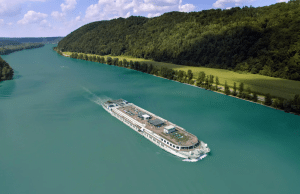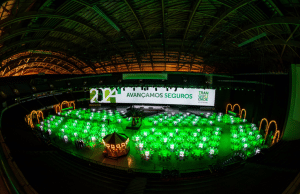“It’s Difficult to Make Predictions, Especially About the Future”
Niels Bohr
As the development of the event and meetings industry is getting faster by the minute, predicting the future has become virtually impossible. Most predictions are based on the visions of large tech companies but that only partially solves the problems of the industry. A big emphasis has been put on different tools that could help change the world of events.
We decided to ask meeting planners for their opinion and 108 of them responded to our questionnaire. The survey took place between the 14th of November and 24th of December 2018.
A: Structure of respondents
The question about the age of respondents in 2030, which is the target year of the survey, was particularly interesting. The survey was filled out by the currently most active event organisers who will be in 2030 in the following age structure:
51 – 70 years 52.6 %
71 years and more 24.7 %
36 – 50 years 21.6 %
26 – 35 years 1 %
Meetings planners from 34 countries responded to our questions. Most of them were from Great Britain, Slovenia, Germany, Italy, Austria, Serbia, Portugal, Spain, France, and Belgium. The structure of the respondents was also interesting. The majority were part of companies that organise meetings, followed by PCO and DMC agencies:
Corporate meeting planner 24 %
Agency (PCO, DMC) 23 %
Event agency 17 %
Convention Bureaus and destination organisations 16 %
Congress venues (hotels, convention centres) 5 %
Other 8 %
More than half of the respondents (51%) organise more than 20 events per year, the second largest group form respondents who prepare 11 to 20 events per year (22.4%). The respondents usually organise medium-sized events with 41 to 200 participants (56.1%).
The structure of the venues, where respondents organize events, is also interesting:
Hotels 40,41 %
Special venues 27,98 %
Conference Centres 20,21 %
Universities 6,74 %
Other 4,66 %

B: What are the biggest challenges of the industry today?
There is no direct link between megatrends and the current challenges of the industry. The present key challenges are namely the budgets of events, the way participants get acquainted, and the creative method for organising events. It is mostly about short-term challenges that the respondents can directly influence. As less important, they see challenges that are beyond their control and reach. A more detailed insight reveals some correlations which are also important for predicting the future, as it is a matter of challenges that are important today but will be crucial in the future. These are, in particular, the challenges of new technologies and digitalization and the question of safety at events.

Event budgets 59.8 %
Finding new ways to attract attendees 36.1 %
Creative meetings and events methods 35.1 %
Knowledge and competences 30.9 %
Destination costs 28.9 %
Keeping pace with technology 26.8 %
Sponsorship at events 25.8 %
Government and legal regulations 25.8 %
Economic uncertainty 22.7 %
ROI and Efficiency of meetings 22.7 %
Digital transformation 21,6 %
Attendee engagement 19.6 %
Event security 17.5 %
Attracting millennials 15.5 %
Connectivity (cloud solutions, internet of things) 14.4 %
Data protection (GDPR) 11.3 %
Terrorism 11.3 %
Extreme weather 8.2 %
Other 4.1 %
Housing pirates 3.1 %
Alternative housing 2.1 %
Pollution 1.0 %
C: What megatrends will influence and challenge the meetings and events industry in the future?
Respondents agree that the key trend that will affect the event organization will be technology, followed by sustainable development. Additional suggestions are also interesting; safety, which can be placed immediately after mobility, stands out and a number of respondents highlighted it as a megatrend.

Technology 73,5 %
Sustainability 59,2 %
Mobility 38,8 %
Demographics 36,7 %
Rise of the individual 27,6 %
Sharing economy 27,6 %
Circular economy 18,4 %
Urbanisation 17,3 %
Feminisation 11,2 %
Other 5,1 %
D: How will the way of organising events change over the next 20 years and what will mostly affect the performance?
– More than half of the respondents think that the time for networking will extend (56.7%).
– Over a half of the respondents (49.5%) think that the length of meetings will be shortened.
– A half of respondents think that the length of the workshops will remain the same (51.5%)
– Half of the respondents think that the length of social events will remain the same (49.5%).
The following technologies will have the biggest impact on organization of events in the future:
3.5 Audience Engagement Solutions
3.26 Augmented/Virtual Reality
3.26 Interactive Tables and Screens
3.23 Real time language translation
2.98 Hologram Projections
2.98 Robotics and Machine Learning
2.92 Drones
Respondents ranked the following as their main priorities in the next 20 years.
Participants satisfaction 7.0
Increasing number of contacts/leads 5.4
Improved engagement with clients 5.0
Revenue increase 4.8
Reaching the relevant audience 4.5
Team spirit 4.4
ROI 3.8
Other 1.1
E: How important will the destination experience be in the future?
Respondents believe that the experience of the destination will be an extremely important factor in choosing a destination. In this regard, they have a very unified opinion as most agree that this will remain an important part of the competitive advantage.
The results are as follows:
The destination experience will be extremely important 72.9%
The destination experience will be very important 15.6%
Experience of the destination will be less important 10.4%
The experience of the destination is partly important 1.0 %
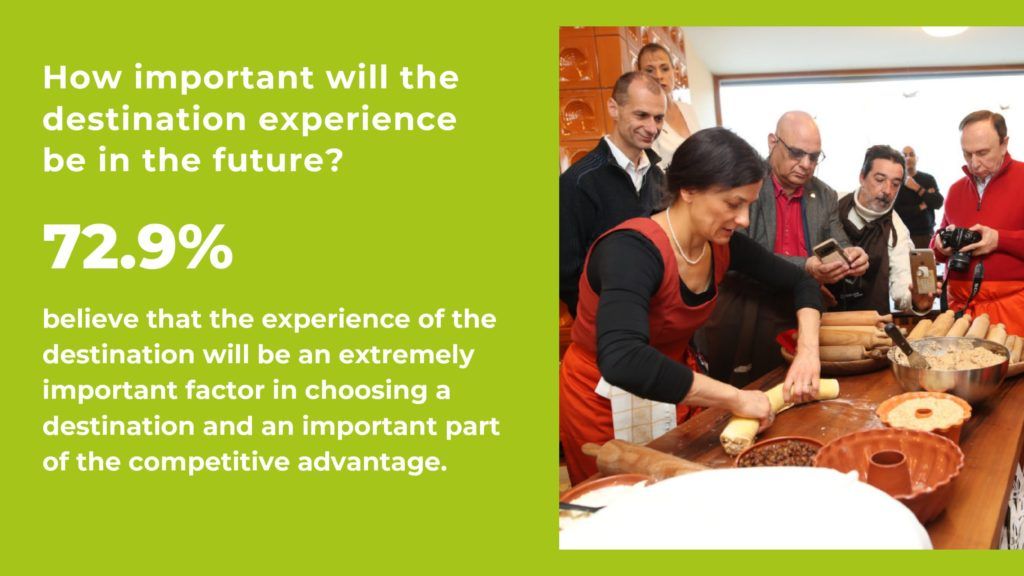
The participants were also asked about the destinations of the future (countries and cities). The answer to this question was very dispersed, as it depends on a number of factors. Nevertheless, a sample of future destinations has been clarified.
Among the countries, the respondents selected:
Island
Spain
Portugal
Austria
Slovenia
The countries of Central Europe and Scandinavia achieved high scores in the survey.
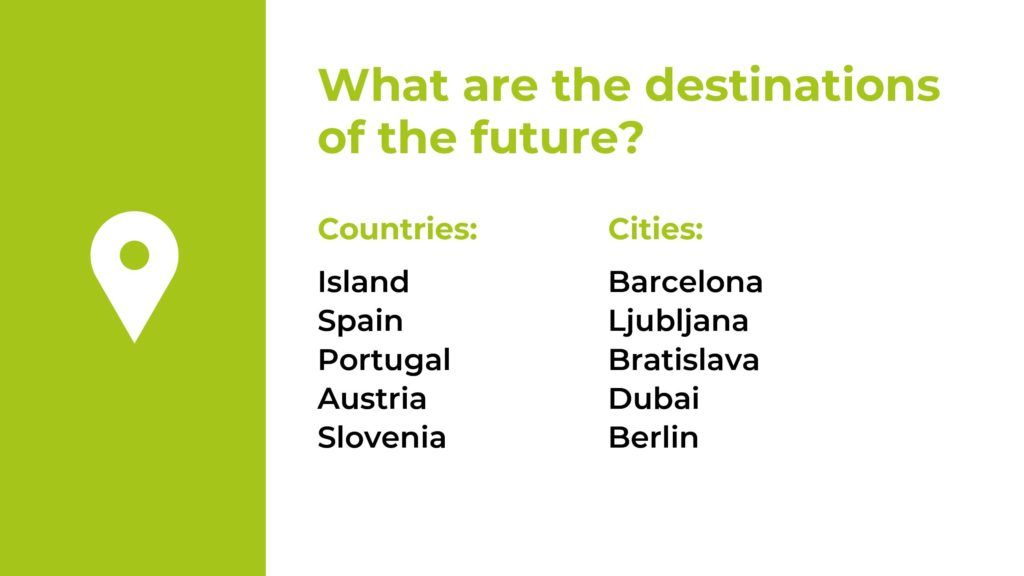
Among the cities, most of the respondents chose:
- Barcelona
- Ljubljana
- Bratislava
- Dubai
- Berlin
The answers about the cities are much more dispersed. Among the comments, the main remark is that this will depend on the safety and accessibility of individual cities, as well as on their marketing.
F: What will be the changes in the field of marketing?
In the marketing field, the changes will be extremely dynamic. We checked the situation by asking a question which marketing channels will have the greatest decrease in consumption over the next 20 years?
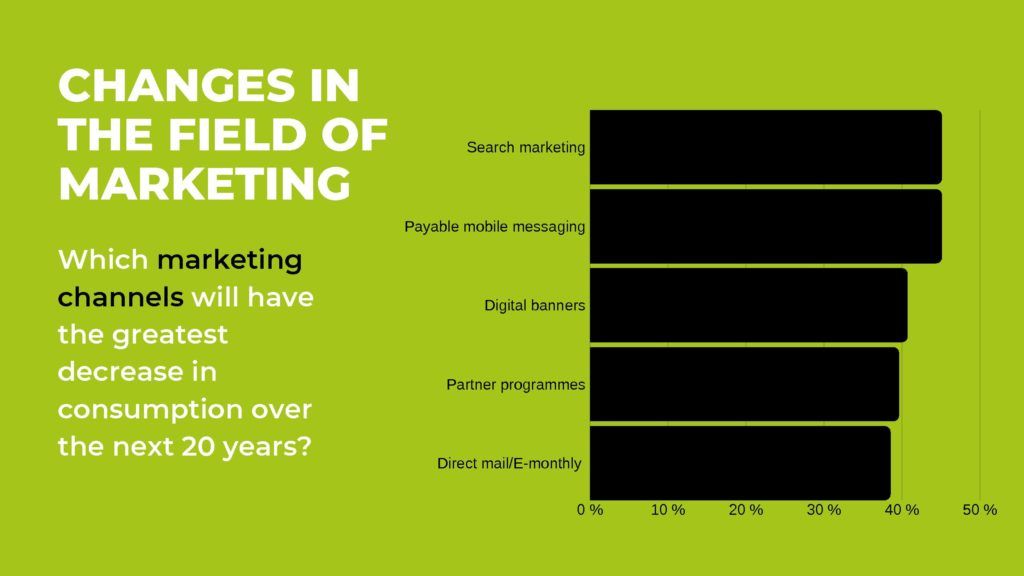
Search marketing 45.1 %
Payable mobile messaging 45.1 %
Digital banners 40.7 %
Partner programmes 39.6 %
Direct mail/E-monthly 38.5 %
Social media 35.2 %
Mobile applications 30.8 %
Digital content marketing 28.6 %
Video advertising 27.3 %
Web pages 26.4 %
SEO optimisation 23.1 %
Predicting marketing trends is probably the most difficult. Nobody knows in what direction the marketing will develop. On the top of the scale, the pious desires of respondents were likely to be expected, which in the future await democratization of digital advertising. In practice that will be difficult, as it is currently dominated by global corporations.
We asked the planners for their personal suggestions regarding the marketing challenges in the future.
The answers were divided into two sections.
The challenges of the future, on which the respondents can influence directly
PayPal wasn’t invented by the banks, Amazon wasn’t invented by the retailers, Airbnb wasn’t invented by hoteliers.
Rapid technological development
Most of the respondents are alarmed by the rapid technological development. There is still a dilemma about the power of virtual meetings. The most interesting is thinking about technology as a tool for meetings and not the essence of meetings. Almost all of the respondents agree that the technological progress will be a key challenge in the future.
Digital Transformation
Nowadays, it seems that there is no need to know anything; today we only need to know whether to search for it or to google it. Knowledge is available anywhere and anytime. There are seemingly invisible services around us, but they can expose old business models. Therefore, it is necessary to think about the total digitization of the organization of events.

Communication is important
Changed participants’ expectations will affect changes in the way of communicating with the participants. This issue is directly related to the rapid technological advancement that enables a more effective communication.
Artificial Intelligence (VR and AI)
Development of artificial intelligence will help us a lot with event organisation. Speech recognition, face recognition, self-driving cars, programs that solve the complex operations of organizing events. All this is possible today and it will be an everyday thing in the future.
Creating unforgettable experiences
Experimenting with various forms, called “meeting design”, has become a standard. Knowing the context of the destination, authenticity and care for the environment is a part of the congress story which we are no longer discussing, but will continue to gain importance in the future.
Personal awareness
Honesty and personal responsibility for everything we think and do. And our shared responsibility is a greater awareness and concern for people and the planet.
Measuring ROI (the added value of events)
It sounds like an already heard phrase, but we live in a period when each member of the congress chain will have to offer more value. A new frame of reflection is directed at the participant and his needs.
Controlling the use of participants private data
Meetings organizers collect information about the participants and in some way, they trade with the collected data. The organizers who are able to integrate data from different services and applications, which is now mostly done with cloud services, are in advantage. Privacy, anonymity and security, or communication encryption, are a challenge for the future.
Challenges of the future, on which the respondents do not have a direct impact

Accessibility
In spite of the complexity of the congressional destinations, accessibility is still the key factor, which is closely correlated with the safety of destinations. There will be major changes in this area neither in the near future nor in the more distant future.
Global uncertainty
The key problem of the meetings industry is the unexpected political and economic events that can fatally affect the industry. We live in a period of continual global uncertainty.
Adapting to different countries
The “one size fits all” model is no longer possible. Global corporations will also have to tailor events to specific local markets and be as flexible as possible.
Climate change
Climate change is a fact. On a global scale, we can only help with orientating in green meetings tourism. All the parts of the meetings industry: agencies, meeting organizers, hotel chains, tourist and convention bureaus are forced to start practicing sustainable measures.
Niche meetings destinations and products
Innovations are happening on the outskirts and there are new congress niches and products there. Today, there are countless meetings destinations and providers in the world and all of them want to succeed. The average destinations will simply not survive.
Interesting answers that raise new questions are:
1. Values will be crucial when creating content of the meetings. In the future, people will be connected on this basis.
2. The key challenge will be to provide top-level personnel. We will have to deal more with the challenges of keeping them.
3. Flooding of various events and the problem of selection between them has become a major problem, especially due to generic copying of content.
4. The intergenerational gap will continue to deepen, the question is, what will be the response of the meetings industry to this question.
According to one of the respondents, the key challenges in the future will be:
- Challenge 1: Getting people’s attention
- Challenge 2: Keeping people participating
- Challenge 3: Being genuine
- Challenge 4: Creating fresh ideas
- Challenge 5: Understanding the client’s needs






